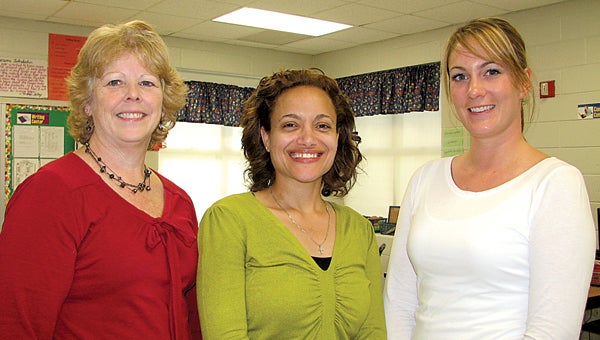Mack Benn gets NASA recognition
Published 11:50 pm Tuesday, October 4, 2011

Explorers: As part of an award Mack Benn Jr. Elementary School received as a NASA Explorer School, teachers, from left, Liz Petry, Catherine Pichon and Megan Farabaugh will get the chance to conduct experiments in a reduced gravity aircraft in Texas while video-conferencing with their students.
After being selected from 1,300 schools across the nation, a Suffolk school is receiving recognition for its commitment to science, technology, engineering and math education.
Mack Benn Jr. Elementary School is one of 14 NASA Explorer Schools to receive the 2011 School Recognition Award.
“We are excited to have this news,” said Catherine Pichon, a fifth-grade gifted cluster teacher who incorporates NASA activities in her classroom.
Liz Petry, the gifted resources teacher who coordinated the NASA activities at Mack Benn Jr., said NASA Explorer Schools can receive teacher, student and school recognition. “School recognition shows we are incorporating NASA activities in our everyday science,” she said.
Megan Farabaugh, a second-grade gifted cluster teacher who uses the NASA explorer school resources in her classroom, said she was surprised to find out Mack Benn was the only school in Virginia to be recognized.
“That was the most shocking thing to me,” she said.
As part of the recognition, Petry, Pichon and Farabaugh will travel to NASA’s Johnson Space Center in Houston to conduct experiments in microgravity on the agency’s reduced gravity aircraft in February.
“I’m very excited,” Pichon said. “It’s a once-in-a-lifetime experience.”
Over the next couple of months, the teachers will conduct experiments that examine how different fluids behave in microgravity, the acceleration and inertia of objects and how the absence of gravity affects mass and weight.
Then, the teachers will conduct the same experiments in the reduced gravity environment during their trip.
Their students will get the opportunity to watch these experiments over video conferencing.
“It’s going to give them more opportunities to do in-depth study of science and high-depth thinking,” Pichon said.
As NASA Explorer School, Mack Benn Jr. receives resources, such as experiment kits, posters and guest speakers, to help them get students excited about science.
Petry said the hands-on activities the group provides and the speakers who discuss science with the students both in person and over video conferencing make the subject come to life for them.
“NASA is so generous with resources and coming to speak,” she said. “These kids talk to people (from NASA) all the time.”
Petry added the students grasp the subject matter better when they experience “anything hands-on.”
“You tell them, but until they see it, it doesn’t mean much,” she said.
Pichon said the NASA resources are particularly well-received by her students this year.
“This is a very strong group in science,” she said. “They love it.”
When the teachers get back, they will study the results of both sets of experiments with their students and share their findings with NASA experts.






